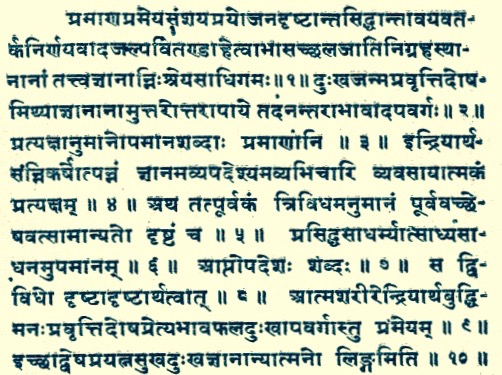Nyāya Sūtras
 The ''Nyāya Sūtras'' is an ancient Indian Sanskrit text composed by , and the foundational text of the Nyaya school of Hindu philosophy. The date when the text was composed, and the biography of its author is unknown, but variously estimated between 6th-century BCE and 2nd-century CE. The text may have been composed by more than one author, over a period of time. The text consists of five books, with two chapters in each book, with a cumulative total of 528 aphoristic sutras, about rules of reason, logic, epistemology and metaphysics.
The ''Nyāya Sūtras'' is an ancient Indian Sanskrit text composed by , and the foundational text of the Nyaya school of Hindu philosophy. The date when the text was composed, and the biography of its author is unknown, but variously estimated between 6th-century BCE and 2nd-century CE. The text may have been composed by more than one author, over a period of time. The text consists of five books, with two chapters in each book, with a cumulative total of 528 aphoristic sutras, about rules of reason, logic, epistemology and metaphysics.The Nyāya Sūtras is a Hindu text,, page 18}} notable for focusing on knowledge and logic, and making no mention of Vedic rituals. The first book is structured as a general introduction and table of contents of sixteen categories of knowledge. Book two is about ''pramana'' (epistemology), book three is about ''prameya'' or the objects of knowledge, and the text discusses the nature of knowledge in remaining books. It set the foundation for Nyaya tradition of the empirical theory of validity and truth, opposing uncritical appeals to intuition or scriptural authority.
The Nyaya sutras cover a wide range of topics, including Tarka-Vidyā, the science of debate or Vāda-Vidyā, the science of discussion. The ''Nyāya Sutras'' are related to but extend the epistemological and metaphysical system. Later commentaries expanded, expounded and discussed Nyaya sutras, the earlier surviving commentaries being by Pakṣilasvāmin Vātsyāyana (5th–6th century CE), followed by the ''Nyāyavārttika'' of Uddyotakāra (6th–7th century CE), Vācaspati Miśra's ''Tātparyatīkā'' (9th century CE), Udayana's ''Tātparyapariśuddhi'' (10th century CE), and Jayanta's ''Nyāyamañjarī'' (10th century CE). Provided by Wikipedia
-
1